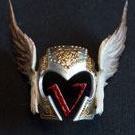Grammar Guide 8 - Regular vs Irregular Verbs
This week we are back to where the action is... verbs! English is the Rube Goldberg Machine of languages and it has a lot of oddities. One of those is this whole concept of regular vs irregular and verb forms.

This also ties in with Grammar Guide 6's topic of Verb Tenses. Be sure to check that out as well, if you missed it.
Verbs have 5 Forms:
- Infinitive - the basic form of the verb ➡️ walk
- Simple Present - Used when the action is happening right now or or happens regularly ➡️ walk
- Simple Past - Used to discuss actions that happened in the past or existed before now ➡️ walked
- Present Participle - used in forming continuous tenses, typically by adding -ing ➡️walking
- Past Participle - used in forming perfect and passive tenses and sometimes as an adjective ➡️ walked
Regular Verbs
For a regular verb, you form a simple past or past participle by adding -ed to the infinitive form of the verb.
Example: walk ➡️ walked
Irregular Verbs
For an irregular verb, you often change words
Example: do ➡️did, done
There are over 200 irregular verbs in the English language. Unfortunately, they are some of our most common words and the only thing you can do is memorize them. Here are a few:

There are a lot more, post some below that aren't on the list!
-
References:
- Kern, Jara. (2020). The Infographic Guide to Grammar. Adams Media
- Venolia, Jan. (2001). Write Right! (4th ed.). Ten Speed Press
-
 2
2
-
 5
5







.thumb.jpg.64fa2767cd8dd6e9d9cd3bbf6494012a.jpg)
6 Comments
Recommended Comments
Create an account or sign in to comment
You need to be a member in order to leave a comment
Create an account
Sign up for a new account in our community. It's easy!
Register a new accountSign in
Already have an account? Sign in here.
Sign In Now